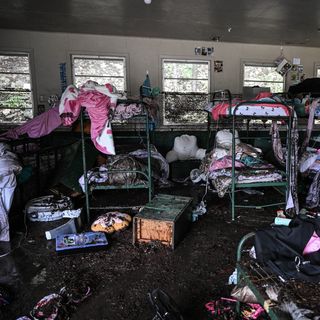Reading view
The Gilded Age Season 3 Episode 3 – Release Date, Schedule, How To Watch
Tropical Storm Chantal Threatens to Capsize Vessels: 'Act Now'
LeBron James Idea Ties Knicks to Offseason Splash Move
Israel and Hamas to hold indirect ceasefire talks in Qatar
Israel rejected Hamas' proposed changes to the latest Gaza hostage and ceasefire deal, but will send negotiators to Qatar on Sunday to try to close remaining gaps, Prime Minister Benjamin Netanyahu's office said Saturday.
Why it matters: While key hurdles remain, the resumption of indirect talks in Qatar is a significant step toward a potential ceasefire between Israel and Hamas.
- The two parties haven't engaged in negotiations since the previous round of talks collapsed six weeks ago.
Driving the news: President Trump has been pressuring both Israel and Hamas — through Qatari and Egyptian mediators — to agree to a deal that includes a 60-day ceasefire in Gaza and the release of 10 living hostages and 18 bodies.
- He wants to see some progress by Monday, when he plans to meet with Netanyahu at the White House.
- Trump told reporters aboard Air Force One on Friday night that he's "very optimistic" about the chances of getting a deal next week.
What they're saying: "The changes Hamas wants to make in the Qatari proposal are unacceptable," the Israeli prime minister's office said in a statement.
- Still, Netanyahu agreed to Qatar's invitation for "proximity talks" with Hamas.
- The statement said the Israeli negotiating team will depart for Doha on Sunday, and emphasized the talks will be "based on the Qatari proposal that Israel has agreed to."
Catch up quick: Hamas said Friday that its response to the proposed ceasefire and hostage deal "can be characterized as positive" and that the Palestinian militant group is ready to begin implementation talks.
- But Hamas also gave Qatari mediators three reservations it wants to address in indirect talks with Israel and the U.S.
- Once the ceasefire begins, Hamas asked for the UN to take back control of humanitarian aid delivery in Gaza. It demanded that the Israel and U.S.-backed Gaza Humanitarian Fund no longer be part of the aid delivery.
- It also wants the IDF to pull back to the positions it held before the March ceasefire collapsed.
Israel has rejected those demands.
Between the lines: Under the current proposal, Israel and Hamas would hold indirect talks during the 60-day ceasefire to negotiate terms for a permanent end to the war.
- The U.S., Qatar and Egypt would commit to extending the truce beyond 60 days if more time is needed.
- Hamas is pushing for a stronger U.S. guarantee that Israel won't be able to unilaterally resume fighting after 60 days.


How to Watch the 2025 Prefontaine Classic: Live Stream Track and Field, TV Channel
Terrified Shelter Dog Was About To Be Euthanized—Then Someone Saw Him
Lakers, Warriors Facing New Competition for Al Horford in NBA Free Agency
What we know about the Texas flooding victims
Efforts to find more than 25 girls missing from Camp Mystic after flash floods hit Central Texas early Friday morning continue, but four bodies — and dozens more from other parts of the region — have already been recovered.
Here's what we know about the victims of the flooding near Kerrville, Texas:
Renee Smajstrla
The young girl has been identified by her uncle as one of the Camp Mystic attendees who went missing and whose body has since been recovered.
- "We are thankful she was with her friends and having the time of her life, as evidenced by this picture from yesterday. She will forever be living her best life at Camp Mystic," Shawn Salta wrote on Facebook.
Sarah Marsh
The 8-year-old Mountain Brook, Alabama, girl was a camper whose body has been found, per the city's mayor.
- "This is an unimaginable loss for her family, her school, and our entire community. Sarah's passing is a sorrow shared by all of us, and our hearts are with those who knew and loved her, " Mayor Stewart Welch wrote in a Facebook post.
Janie Hunt
The girl's family confirmed to NBC5 reporter Keenan Willard that she had died in the floods while at Camp Mystic.
Lila Bonner
Bonner's family also confirmed the girl had died.
- "In the midst of our unimaginable grief, we ask for privacy and are unable to confirm any details at this time. We ache with all who loved her," the girl's family said in a statement to NBC5.
Other people who were camping or lived near Guadalupe River, which surged to roughly 26 feet within 45 minutes, also were victims. They include:
Jane Ragsdale
The beloved co-owner and director of Heart O' the Hills camp was killed in floods, according to a statement posted on the camp's website.
- "We at the camp are stunned and deeply saddened by Jane's death. She embodied the spirit of Heart O' the Hills and was exactly the type of strong, joyful woman that the camp aimed to develop with the girls entrusted to us each summer."
- The girls' camp opened in 1953. There were no campers at the time of the floods.
Julian Ryan
Ryan, 27, "died a hero," his family told KHOU in Houston.
- Ryan's fiancée told the station water quickly entered their home near the Guadalupe River. Ryan punched out a window to get his family out, she said, but he was ultimately unable to make it out.
- "Julian was a cherished son and devoted parent and fiancé who was dedicated to his family. He was known to have an infectious laugh and unwavering kindness," according to a GoFundme account raising money for his family.
- "He touched countless lives with his humor and will be deeply missed by everyone who had the privilege of knowing him."
Editor's note: This is developing story.


Trump Admin Touts 'Win' After South Sudan Deportations Completed
Elon Musk Announces Plan To Make 'America Party'
Mom Captures Moment Between Two Sons—No Idea It Will Be Their Last Together
What we know about Camp Mystic
More than two dozen kids from the all-girls private camp, Camp Mystic, remained missing Saturday after catastrophic floods hit the area Thursday into Friday.
Here's what we know about the camp:
- Mystic Camp is nestled in Texas' Hill Country, along the banks of the Guadalupe River, which on Friday reached the second-highest height on record in the unincorporated community of Hunt. The campsite is surrounded by cypress, live oak and pecan trees, per the camp's website.
- Roughly 700 kids were at the camp when flooding began, according to Lt. Gov. Dan Patrick, who said about 23 girls were unaccounted for as of Friday afternoon.
- Campers Lila Bonner and Janie Hunt, who were both 9 years old, and 8-year-old Sarah Marsh have been found dead, per CNN.
Flashback: Founded in 1926 by University of Texas coach Edward James "Doc" Stewart, Mystic Camp is a nondenominational Christian camp for girls who have finished second grade.
- It was purchased by another family in 1939 and has been operated by descendants since, per its website.
- "In the Mystic spirit, their goals are to boost every camper's self-confidence and to nurture the development of their individual character," the website says of the current owners, Dick and Tweety Eastland.
Zoom in: Camp Mystic offers over 30 activities including many sports, arts and crafts, theater and more.
- The camp offers two 4-week terms starting in May and a 2-week term in late July.
What we're watching: Authorities continue search and rescue efforts.
Editor's note: This story has been updated with the latest details on missing campers and flooding.


When my boyfriend and I blended our families and traditions, we realized we needed to form new traditions, too
Imgorthand/Getty Images
- When my boyfriend and I blended our families we made sure to honor past traditions.
- We soon realized that it was important for our new family to create our own traditions.
- New traditions like s'mores nights have helped bring our family together.
The morning my boyfriend and I met for our first coffee date, we both knew there was something special between us.
We spoke the language of grief, of solo parents, of young widows who'd lost their forever person to cancer. We understood the hurdles inherent in opening your heart after loss and the way heartache and hope coexist in a single breath.
We understood the unspoken things, and when we made the choice, last year, to blend our families, we understood the challenge we were undertaking.
With the goal of building a family of six out of our respective families of three — two adults and four children, ranging in age from 3 to 15 — we blended the things we can see including furniture, kitchenware, bedtime routines, schedules. We also blended the things we can't see such as rules, values, and most importantly, traditions.
There isn't always a perfect blend
Some of the traditions were easy to blend. Our sushi Fridays merged with their pizza Fridays and became an alternating schedule of pizza and sushi. Our weeknights watching dramedies morphed into starting the night with a round of Netflix cartoons before bedtime for the littlest kids.
Other traditions — the ones that involve extended family and grief and four children who had to learn resilience too early — were harder. There's no way to be two different places at once on Thanksgiving. There's no way to decorate a Christmas tree with ornaments that belonged to their person while lighting a menorah that belonged to ours without unsettling the grief we've learned to co-exist with.
When it comes to those traditions, we've had to accept that there won't be a perfect blend, there won't be a seamless way to shape two traditions into one. We've had to realize that we won't get it right on the first try, or even the second, and we've had to compromise, communicate, and forge a way that works for all of us.
Our new family needed more
It turns out, blending traditions isn't enough to build a family from the ground up. Because the heart and soul of any family lives, often, in their traditions. In the way they celebrate birthdays and special occasions. The way they spend their Saturday mornings and Sunday nights. The way they build a life in the little things that hold the most meaning. To truly build a family that was uniquely ours, we needed to build our own traditions. Ones that were new to all six of us.
Courtesy of Elaine Roth.
Our traditions were small to start: s'mores on Friday nights, Saturday afternoons on the basketball court, weeknights dropping onto the couch to watch Wheel of Fortune — and it's hard to tell if we're on the right track. Should we have developed more traditions by now or are we right to hope the traditions will come on their own with time? Are we hitting the right balance of old and new or are we tipping the scales too far in one direction?
The truth is I don't know, and for our untraditional family, our crew of six which is so intimately acquainted with grief, the answers to those questions don't matter. For us, the only thing that matters is that whatever tradition we're honoring—old or new, blended or not, on track or way off the deep end—we do it with an open heart and an eye toward building a family.
A family that's not mine or theirs, but ours.
How to Watch Real Madrid vs Borussia Dortmund: Live Stream FIFA Club World Cup Quarterfinals, TV Channel
Trump Admin Monitoring DHS Detention Facilities Attacks: 'Zero Tolerance'
Bookmakers Release Odds for UFC's White House Fight Night
How to Watch France vs England: Live Stream UEFA Women's Euro 2025, TV Channel
Pixar's chief creative officer says AI is 'the least impressive blah average of things'
LISA O'CONNOR / AFP
- Pixar's Pete Docter said he doesn't think AI will fully replace humans in animated filmmaking.
- However, the chief creative director said AI could relieve animators of some "heavy burdens."
- Last month, Pixar released "Elio," a sci-fi animated film.
Not everyone believes AI spells the end for animators.
Pixar's chief creative officer, Pete Docter, recently said on comedian Mike Birbiglia's "Working It Out" podcast that he was unimpressed with AI so far, calling it "bland."
"AI seems like it is the least impressive blah average of things," he said.
AI is an anxiety-inducing topic in Hollywood. Critics of the technology are concerned that it could eliminate jobs across the entertainment industry. It was one of the reasons unionized writers went on strike for nearly five months in 2023. Those in support of integrating AI, on the other hand, like director James Cameron, believe it could make the filmmaking process more cost-effective.
From Docter's perspective, while he said everyone is "troubled" by AI, he doesn't think it will erase humans from the animated filmmaking process. Pixar's 29th animated feature, "Elio," hit theaters on June 20.
"If you look back in time, the number of hand-drawn animators that were really brilliant was in the dozens," Docter said. "A very small number of people who could draw well enough. Understood the dynamic of movement. Character acting. Had the right sensibilities."
Computers, he said, made animation more accessible, meaning people don't have to be a "brilliant draft person" to be an animator. "I still have to have performance and timing, but one of the heavy lifts has been done by the computer," he said.
Docter said AI, like computers, could alleviate some of the more cumbersome tasks associated with animation.
"I was wondering whether AI will continue to help us lift some of the heavy burdens that we have to carry as an animator and maybe put the focus more on the performance," he said.
Representatives for Disney did not respond to a request for comment from Business Insider.